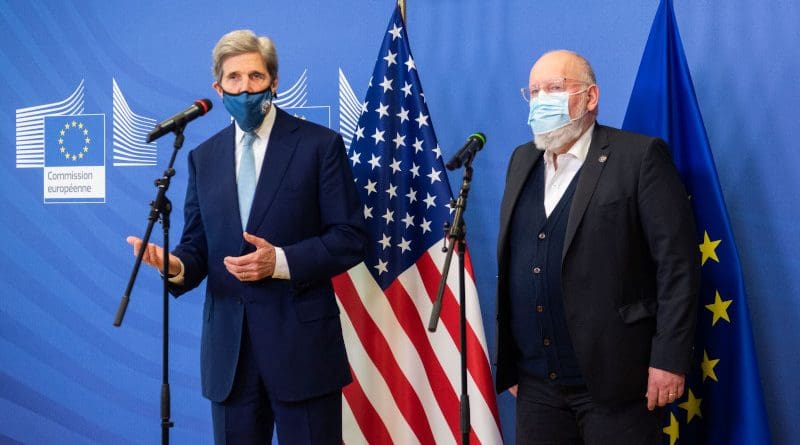Kerry Promotes Climate Alignment With Europe
By EurActiv
By Kira Taylor
(EurActiv) — The EU and Washington need to align to tackle climate change, US envoy John Kerry said in Brussels on Tuesday (9 March), confirming the new US administration’s policy shift away from Donald Trump’s roll back of environmental protections.
“We have no better partners than our friends here in Europe in the EU. It is important for us to align ourselves now, which is what we will discuss today, because no one country can resolve this crisis. It will take every country,” said Kerry, at a joint press conference with EU Green Deal chief, Frans Timmermans.
The next decade must be a decade of action, added Kerry, emphasising that meeting Paris commitments would not be enough to avoid drastic global warming.
Kerry met with the College of Commissioners, Vice President Josep Borrell and Commission President Ursula von der Leyen, who said that there is a lot of work to do on the climate and the EU cannot do it alone.
“It’s wonderful to know that we have a friend again in the White House,” von der Leyen added.
Timmermans also emphasised the need for the US and the EU – two of the world’s largest emitters – to work together ahead of COP 26 in Glasgow in November.
“We’ll be working hand in hand to make a success of Glasgow. It’s going to be quite an effort to get there. It’s going to be quite an effort to convince other major players in the world to do the right thing,” he said.
The US and Europe together, he added, could “move mountains” and drive the shift to a world that is liveable in and works within planetary boundaries.
Neither Kerry nor Timmermans elaborated on what they could “align”, but some climate activists have urged the world leaders to align on climate diplomacy and pressure China to increase its climate ambition.
“The EU and US can become the new engine for global climate action, but only if everyone is pulling in the same direction,” said Jennifer Tollman, senior policy adviser at the think tank, E3G. “Aligning on key climate action diplomacy and regulatory issues can encourage other major emitters to do more and shape the rules of emerging green markets globally.”
But she cautioned that current climate diplomacy between the US and the EU is only strongly aligned in principle, not in practice.
Another possible alignment could be on some form of carbon pricing or levy. The EU is planning to put forward its carbon border adjustment mechanism proposal in June, and US support would help avoid retaliation on trade and a possible backlash in the WTO.
Renewed relations
Kerry’s visit marks a major pivot for EU-US relations and US climate policy. Since taking office, President Biden has reversed many Trump era policies and rejoined the Paris Agreement.
The US is expected to pledge its long-term goal of net-zero by 2050 and deliver an updated nationally determined contribution by April, when it will host the Leaders’ Climate Summit on Earth Day (22 April).
Kerry said he had come to “renew” cooperation on climate action with Europe, adding, “It will have to be even stronger now … We face an extraordinary crisis because the science is screaming at us.”
The visit is a strong message that the US is back in climate negotiations with stronger ambition, said Julian Popov, former minister of environment from Bulgaria.
“It is also a sign that the US want to catch up and compensate their four years absence under Trump,” he added.
Unaddressed challenges
The short press conference glossed over many of the underlying issues in climate diplomacy between the EU and the US, like Nord Stream 2 pipeline, and on a global stage, climate relations with China.
Although LNG exports from the US increased substantially under Trump and are predicted to continue on this trajectory, Washington has voiced opposition to the construction of Nord Stream 2, the gas pipeline connecting Russia and Germany, and is ready to impose sanctions on companies participating in it.
China also went unmentioned, although Kerry’s visit follows the release of China’s fourteenth five-year plan, which has been met with criticism for its lack of ambition on decarbonisation.
Alignment between the EU and the US on climate expectations from China could increase pressure on Bejing to increase its climate ambition.
“If the EU and US presented coherent plans for increased climate ambition in the short term, they will give a constructive signal to China and other major economies who have increased their climate pledges recently,” said Agnese Ruggiero, policy officer at Carbon Market Watch.
“The sheer idea of a CBAM (carbon border adjustment mechanism) could have helped to trigger some more climate commitments from major economies like Japan and even China itself, but ultimately it cannot replace global diplomatic efforts to ensure more climate action across the board,” she added.

